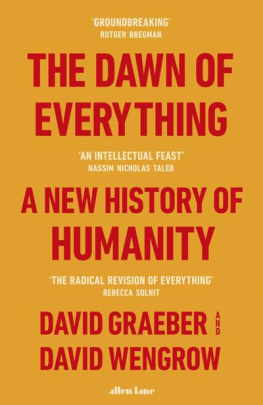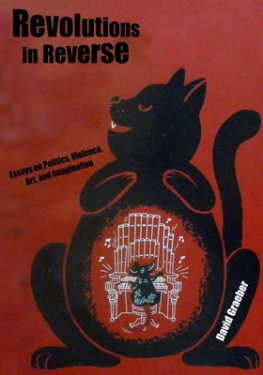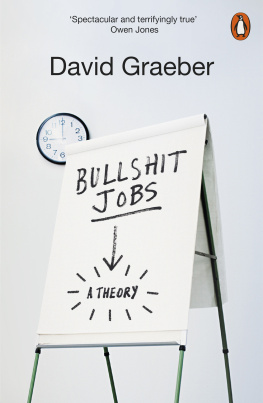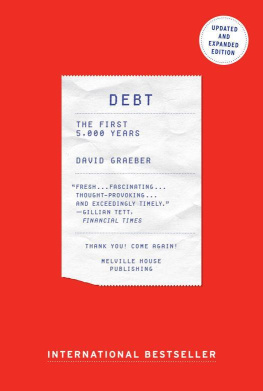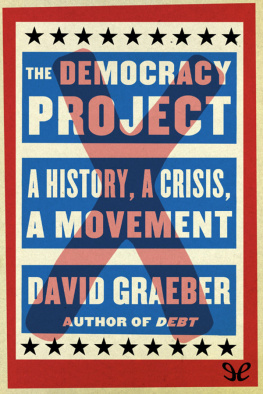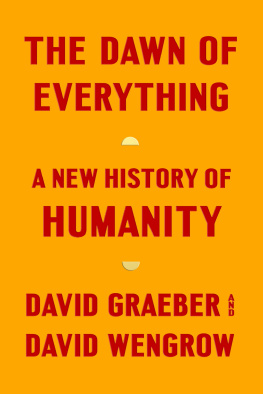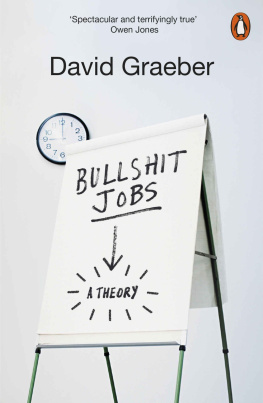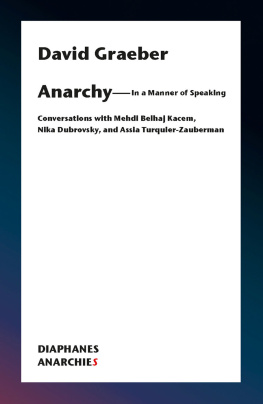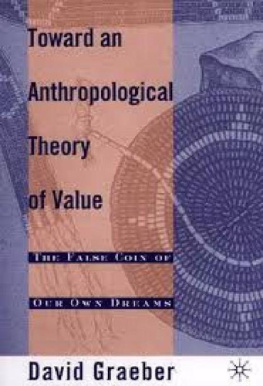David Graeber - The Dawn of Everything
Here you can read online David Graeber - The Dawn of Everything full text of the book (entire story) in english for free. Download pdf and epub, get meaning, cover and reviews about this ebook. year: 2021, publisher: Penguin Books Ltd, genre: Religion. Description of the work, (preface) as well as reviews are available. Best literature library LitArk.com created for fans of good reading and offers a wide selection of genres:
Romance novel
Science fiction
Adventure
Detective
Science
History
Home and family
Prose
Art
Politics
Computer
Non-fiction
Religion
Business
Children
Humor
Choose a favorite category and find really read worthwhile books. Enjoy immersion in the world of imagination, feel the emotions of the characters or learn something new for yourself, make an fascinating discovery.
- Book:The Dawn of Everything
- Author:
- Publisher:Penguin Books Ltd
- Genre:
- Year:2021
- Rating:4 / 5
- Favourites:Add to favourites
- Your mark:
- 80
- 1
- 2
- 3
- 4
- 5
The Dawn of Everything: summary, description and annotation
We offer to read an annotation, description, summary or preface (depends on what the author of the book "The Dawn of Everything" wrote himself). If you haven't found the necessary information about the book — write in the comments, we will try to find it.
The Dawn of Everything — read online for free the complete book (whole text) full work
Below is the text of the book, divided by pages. System saving the place of the last page read, allows you to conveniently read the book "The Dawn of Everything" online for free, without having to search again every time where you left off. Put a bookmark, and you can go to the page where you finished reading at any time.
Font size:
Interval:
Bookmark:


- 1 Farewell to Humanitys Childhood :
Or, why this is not a book about the origins of inequality - 2 Wicked Liberty :
The indigenous critique and the myth of progress - 3 Unfreezing the Ice Age :
In and out of chains: the protean possibilities of human politics - 4 Free People, the Origin of Cultures, and the Advent of Private Property :
(Not necessarily in that order) - 5 Many Seasons Ago :
Why Canadian foragers kept slaves and their Californian neighbours didnt; or, the problem with modes of production - 6 Gardens of Adonis :
The revolution that never happened: how Neolithic peoples avoided agriculture - 7 The Ecology of Freedom :
How farming first hopped, stumbled and bluffed its way around the world - 8 Imaginary Cities :
Eurasias first urbanites in Mesopotamia, the Indus valley, Ukraine and China and how they built cities without kings - 9 Hiding in Plain Sight :
The indigenous origins of social housing and democracy in the Americas - 10 Why the State Has No Origin :
The humble beginnings of sovereignty, bureaucracy and politics - 11 Full Circle :
On the historical foundations of the indigenous critique - 12 Conclusion :
The dawn of everything
David Graeber was a professor of anthropology at the London School of Economics. He is the author of Debt: The First 5,000 Years and Bullshit Jobs: A Theory, and was a contributor to Harpers Magazine, The Guardian, and The Baffler. An iconic thinker and renowned activist, his early efforts helped to make Occupy Wall Street an era-defining movement. He died on 2 September 2020.
David Wengrow is a professor of comparative archaeology at the Institute of Archaeology, University College London, and has been a visiting professor at New York University. He is the author of three books, including What Makes Civilization?. Wengrow conducts archaeological fieldwork in various parts of Africa and the Middle East.
David Graeber:
Toward an Anthropological Theory of Value: The False Coin of Our Own Dreams
Fragments of an Anarchist Anthropology
Lost People: Magic and the Legacy of Slavery in Madagascar
Direct Action: An Ethnography
Debt: The First 5,000 Years
The Democracy Project: A History, a Crisis, a Movement
The Utopia of Rules: On Technology, Stupidity, and the Secret Joys of Bureaucracy
Bullshit Jobs: A Theory
David Wengrow:
The Archaeology of Early Egypt: Social Transformations in North-East Africa, 10,000 to 2650 BC
What Makes Civilization? The Ancient Near East and the Future of the West
The Origins of Monsters: Image and Cognition in the First Age of Mechanical Reproduction
North America as defined by early-twentieth-century ethnologists (inset: the ethno-linguistic shatter zone of Northern California)
(After C. D. Wissler (1913), The North American Indians of the Plains, Popular Science Monthly 82; A. L. Kroeber (1925), Handbook of the Indians of California. Bureau of American Ethnology Bulletin 78. Washington, DC: Smithsonian Institution.)
The Fertile Crescent of the Middle East Neolithic farmers in a world of Mesolithic hunter-foragers, 85008000 BC
(Adapted from an original map by A. G. Sherratt, courtesy S. Sherratt.)
Independent centres of plant and animal domestication
(Adapted from an original map, courtesy D. Fuller.)
Nebelivka: a prehistoric mega-site in the Ukrainian forest-steppe
(Based an original map drawn by Y. Beadnell on the basis of data from D. Hale; courtesy J. Chapman and B. Gaydarska.)
Teotihuacan: residential apartments surrounding major monuments in the central districts
(Adapted from R. Millon (1973), The Teotihuacn Map. Austin: University of Texas Press, courtesy the Teotihuacan Mapping Project and M. E. Smith.)
Some key archaeological sites in the Mississippi River basin and adjacent regions
(Adapted from an original map, courtesy T. R. Pauketat.)
Above: arrangement of different clans (15) in an Osage village. Below: how representatives of the same clans arranged themselves inside a lodge for a major ritual.
(After A. C. Fletcher and F. La Flesche (1911), The Omaha tribe. Twenty-seventh Annual Report of the Bureau of American Ethnology, 19056. Washington D.C.: Bureau of American Ethnology; and F. La Flesche (1939), War Ceremony and Peace Ceremony of the Osage Indians. Bureau of American Ethnology Bulletin 101. Washington: US Government.)
(by David Wengrow)
David Rolfe Graeber died aged fifty-nine on 2 September 2020, just over three weeks after we finished writing this book, which had absorbed us for more than ten years. It began as a diversion from our more serious academic duties: an experiment, a game almost, in which an anthropologist and an archaeologist tried to reconstruct the sort of grand dialogue about human history that was once quite common in our fields, but this time with modern evidence. There were no rules or deadlines. We wrote as and when we felt like it, which increasingly became a daily occurrence. In the final years before its completion, as the project gained momentum, it was not uncommon for us to talk two or three times a day. We would often lose track of who came up with what idea or which new set of facts and examples; it all went into the archive, which quickly outgrew the scope of a single book. The result is not a patchwork but a true synthesis. We could sense our styles of writing and thought converging by increments into what eventually became a single stream. Realizing we didnt want to end the intellectual journey wed embarked on, and that many of the concepts introduced in this book would benefit from further development and exemplification, we planned to write sequels: no less than three. But this first book had to finish somewhere, and at 9.18 p.m. on 6 August David Graeber announced, with characteristic Twitter-flair (and loosely citing Jim Morrison), that it was done: My brain feels bruised with numb surprise. We got to the end just as wed started, in dialogue, with drafts passing constantly back and forth between us as we read, shared and discussed the same sources, often into the small hours of the night. David was far more than an anthropologist. He was an activist and public intellectual of international repute who tried to live his ideas about social justice and liberation, giving hope to the oppressed and inspiring countless others to follow suit. The book is dedicated to the fond memory of David Graeber (19612020) and, as he wished, to the memory of his parents, Ruth Rubinstein Graeber (19172006) and Kenneth Graeber (19141996). May they rest together in peace.
Sad circumstances oblige me (David Wengrow) to write these acknowledgements in David Graebers absence. He is survived by his wife Nika. Davids passing was marked by an extraordinary outpouring of grief, which united people across continents, social classes and ideological boundaries. Ten years of writing and thinking together is a long time, and it is not for me to guess whom David would have wished to thank in this particular context. His co-travellers along the pathways that led to this book will already know who they are, and how much he treasured their support, care and advice. Of one thing I am certain: this book would not have happened or at least not in anything remotely like its present form without the inspiration and energy of Melissa Flashman, our wise counsel at all times in all things literary. In Eric Chinski of Farrar, Straus and Giroux and Thomas Penn of Penguin UK we found a superb editorial team and true intellectual partners. For their passionate engagements with and interventions in our thinking over many years, heartfelt thanks to Debbie Bookchin, Alpa Shah, Erhard Schttpelz and Andrea Luka Zimmerman. For generous, expert guidance on different aspects of the book thanks to: Manuel Arroyo-Kalin, Elizabeth Baquedano, Nora Bateson, Stephen Berquist, Nurit Bird-David, Maurice Bloch, David Carballo, John Chapman, Luiz Costa, Philippe Descola, Aleksandr Diachenko, Kevan Edinborough, Dorian Fuller, Bisserka Gaydarska, Colin Grier, Thomas Grisaffi, Chris Hann, Wendy James, Megan Laws, Patricia McAnany, Barbara Alice Mann, Simon Martin, Jens Notroff, Jos R. Oliver, Mike Parker Pearson, Timothy Pauketat, Matthew Pope, Karen Radner, Natasha Reynolds, Marshall Sahlins, James C. Scott, Stephen Shennan and Michele Wollstonecroft.
Next pageFont size:
Interval:
Bookmark:
Similar books «The Dawn of Everything»
Look at similar books to The Dawn of Everything. We have selected literature similar in name and meaning in the hope of providing readers with more options to find new, interesting, not yet read works.
Discussion, reviews of the book The Dawn of Everything and just readers' own opinions. Leave your comments, write what you think about the work, its meaning or the main characters. Specify what exactly you liked and what you didn't like, and why you think so.

